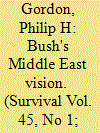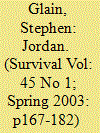|
|
|
Sort Order |
|
|
|
Items / Page
|
|
|
|
|
|
|
| Srl | Item |
| 1 |
ID:
023642


|
|
|
|
|
| Publication |
2003.
|
| Description |
p155-166
|
| Summary/Abstract |
At the heart of the Bush administration's approach to the Middle East is the determination to use America's unprecedented power to reshape the Middle East by supporting America's friends in the region, opposing its enemies and seeking to promote democracy and freedom. This means using force to overthrow the dictatorship in Iraq, promoting gradual political reform among the moderate Arab regimes and standing by Israel until the Palestinians understand that they will get nowhere with violence. Whether or not one thinks that it makes any sense – and there are plenty of reasons to believe that Bush's assumptions are misguided and that the approach will fail – it is important to understand and take seriously the new thinking in Washington.
|
|
|
|
|
|
|
|
|
|
|
|
|
|
|
|
| 2 |
ID:
023636


|
|
|
|
|
| Publication |
2003.
|
| Description |
p25-43
|
| Summary/Abstract |
Although radical Islam suffered numerous political defeats in the 1990s, it is still socially and culturally vigorous throughout the Middle East. The retreat of the welfare state in many cash-strapped Arab countries has opened the way for Islamic social organisations to fill the void, creating a new outlet for those critical of secularist elites and frustrated by their lack of political voice. The alternative of liberal Islam, meanwhile, has failed to draw disciples beyond a small minority from the educated classes. The struggle that counts, therefore, is between Islamic radicalism and the authoritarian powers that be.
|
|
|
|
|
|
|
|
|
|
|
|
|
|
|
|
| 3 |
ID:
023640


|
|
|
|
|
| Publication |
2003.
|
| Description |
p117-130
|
| Summary/Abstract |
Current debates on military force focus on the interrelated questions of pre-emption and unilateralism. While the US rightly reserves the prerogative to make its own ultimate decisions on the use of force, it will be frequently necessary, invariably helpful and almost always possible, to secure broad international support. That support need not always be in the form of a UN Security Council resolution. As for pre-emption, the realities of WMD are such that the meaningful right to self-defence does not require absorbing a first blow. Indeed, even at early stages of WMD development, the problem with pre-emption is not legality, but operational difficulty.
|
|
|
|
|
|
|
|
|
|
|
|
|
|
|
|
| 4 |
ID:
023638


|
|
|
|
|
| Publication |
2003.
|
| Description |
p67-97
|
| Summary/Abstract |
France has long been on the ‘bleeding edge’ of international terrorism. In the last 20 years in particular, it has suffered repeated waves of both international and domestic terror. As a result, France has developed, largely by costly trial and error, a fairly effective system for fighting terrorism at home. This system is uniquely French, tailored to France's particular threats, capacities and civic culture. Nonetheless, there are lessons from France's experience for other countries, including the United States. Three stand out: the advantages of a centralised and specialised judicial process; the importance of creating strong, trusting relationships between judicial and intelligence organisations; and the need to understand the interaction between counter-terrorism efforts at home and abroad.
|
|
|
|
|
|
|
|
|
|
|
|
|
|
|
|
| 5 |
ID:
023639


|
|
|
|
|
| Publication |
2003.
|
| Description |
p99-116
|
| Summary/Abstract |
As it became a non-permanent member of the UN Security Council in January 2003, Germany stepped up its opposition to war with Iraq. The stage was set for a repeat of Germany's uncomfortable position during the 1991 Gulf War. At that time, as most of Germany's allies rallied behind Washington, Germany made only financial contributions, and hundreds of thousands of Germans took to the streets to protest against the war. Yet, since 1991, Germany had come a long way in its attitudes towards military force. From a policy of complete abstention from military deployments beyond NATO's area (so-called ‘out-of-area’ missions), Berlin had moved to participation in a range of operations in the Balkans, East Timor and Afghanistan. The new crisis over Iraq threatened to undo this progress. Thus, it is worth examining the limits to, and possibilities of, reunified Germany's willingness to use military force abroad.
|
|
|
|
|
|
|
|
|
|
|
|
|
|
|
|
| 6 |
ID:
023641


|
|
|
|
|
| Publication |
2003.
|
| Description |
p131-154
|
| Summary/Abstract |
Over the last year, President George W. Bush has articulated a clear, Wilsonian vision of world politics. Arguing a universal natural right to human liberty, the president calls upon America to shoulder the responsibility of constructing a global order based on free, liberal societies. The president suggests that America's unchallenged military supremacy creates the possibility for this transformation, that America has a moral obligation to lead in this undertaking, and that other nations have a moral duty to join in. This vision, however powerful, fundamentally misunderstands the nature of the task and the real challenges to liberalism. Worse, the strategy outlined by the president is likely to undermine international liberal institutions and liberal consensus at home.
|
|
|
|
|
|
|
|
|
|
|
|
|
|
|
|
| 7 |
ID:
023644


|
|
|
|
|
| Publication |
2003.
|
| Description |
p183-202
|
| Summary/Abstract |
While conflict and propaganda have twinned each other throughout history, international peacemaking and peacekeeping interventions are a recent phenomenon. These operations have had to develop a capacity for tackling the problem of media manipulation in societies racked by, or recovering from, massive conflict. These efforts have been conducted for the most part in the dark. There was little organisational awareness of how to react either to the incendiary uses of media in Rwanda before and during the 1994 genocide, or to the systematic manipulation of public opinion in Bosnia after Dayton. International peace operations have often seemed at a loss when facing hostile propaganda emitted by host governments after ‘consenting’ to deployments on their soil.
|
|
|
|
|
|
|
|
|
|
|
|
|
|
|
|
| 8 |
ID:
065543


|
|
|
|
|
| Publication |
2003.
|
| Description |
p167-182
|
|
|
|
|
|
|
|
|
|
|
|
|
|
|
|
| 9 |
ID:
023635


|
|
|
|
|
| Publication |
2003.
|
| Description |
p7-24
|
| Summary/Abstract |
As the world focuses on Iraq, North Korea is seeking to expand its nuclear arsenal as quickly as possible. By summer 2003, barring major technical mishaps, North Korea will be able to extract enough plutonium from spent nuclear fuel for up to half a dozen nuclear weapons, to add to its current suspected stockpile of one or possibly two nuclear weapons. Over the next several years, North Korea could complete facilities capable of producing sufficient plutonium and highly enriched uranium for up to a dozen nuclear weapons annually. Options for dealing with this threat are limited. For now, at least, Washington's basic approach seems to be to ignore and downplay the North Korean threat as much as possible, while focusing its energies on Iraq. Once Iraq is out of the way, Washington will face an even greater challenge in overcoming internal divisions and designing an effective strategy to deal with North Korea, where military and political options are more limited and the adversary is more powerful.
|
|
|
|
|
|
|
|
|
|
|
|
|
|
|
|
| 10 |
ID:
023637


|
|
|
|
|
| Publication |
2003.
|
| Description |
p45-66
|
| Summary/Abstract |
Turkey has been repeatedly cited as proof that Islam is compatible with democracy and that Muslim countries are not inevitably anti-Western. The landslide electoral victory in November 2002 of the Justice and Development Party (JDP) – which had emerged from an anti-Western, Islamist tradition – renewed a debate about both the future of secularism in Turkey and its potential as a model for the rest of the Muslim world. Yet the Turkish version of secularism is sui generis, inseparable from the authoritarian creed of Kemalism. So long as the Kemalist establishment continues to restrict the JDP's room for manoeuvre, it will be difficult to know whether the governing party's avowed enthusiasm for democracy and EU accession is genuine.
|
|
|
|
|
|
|
|
|
|
|
|
|
|
|
|
|
|
|
|
|